#et-libitum
Explore tagged Tumblr posts
Text
Pour égayer vos prochaines réunions de famille : mariage, fiançailles, première communion, obsèques de pépé, etc.
À donner à chanter, en fin de repas bien arrosé, à un gosse de 8-10 ans à la voix virginale et candide, genre enfant de chœur, de préférence pas trop dessalé. Pour l’encourager, les invités taperont dans leurs mains et joindront leurs voix sur les reprises.
Succès garanti, ou alors c’est que vous avez lésiné sur le jaja. Elle est d’une autre caste Que nous apparemment N’offrant jamais un chaste Baiser la sœur de Jean Ô gué ! Baiser la sœur de Jean Elle tourne le dos Boude à tout bout de champ En se contentant d��o- Piner la sœur de Jean Ô gué ! Piner la sœur de Jean Elle dit non, bégueule À qui n’a plus de pain Et mendie une seule Miche à la sœur de Jean Ô gué ! Miche à la sœur de Jean Quand une sauterelle Paraît, elle prétend Que la bête s’appelle Bourdon la sœur de Jean Ô gué ! Bourdon la sœur de Jean Elle promet la lune Empoche votre argent Ne jamais confier une Chatte à la sœur de Jean Ô gué ! Chatte à la sœur de Jean Il roule par étapes À un rythme affligeant Le vieux tacot, le tape- Cul de la sœur de Jean Ô gué ! Cul de la sœur de Jean Dans tout le voisinage On ne l’aime pas tant C’est bizarre l’image Qu’ont de la sœur de Jean Ô gué ! Un tas de braves gens On la déteste en somme Avouons-le sans tourment Au fait, elle se nomme Annick la sœur de Jean Ô gué ! Annick la sœur de Jean Ô gué ! Annick la sœur de Jean (ad libitum)
9 notes
·
View notes
Photo
Madame rêve d'atomiseurs Et de cylindres si longs Qu'ils sont les seuls Qui la remplissent de bonheur Madame rêve d'artifices De formes oblongues Et de totems qui la punissent Rêve d'archipels De vagues perpétuelles Sismiques et sensuelles D'un amour qui la flingue D'une fusée qui l'épingle Au ciel Au ciel On est loin des amours de loin On est loin des amours de loin, on est loin madame rêve ad libitum Comme si s'était tout comme Dans les prières Qui emprisonnent et vous libèrent Madame rêve d'apesanteur Des heures, des heures de voltige à plusieurs Rêve de fougères De foudres et de guerres À faire et à refaire D'un amour qui la flingue D'une fusée qui l'épingle Au ciel Au ciel On est loin des amours de loin On est loin des amours de loin, on est loin
Bashung

Sharon Angelia
3K notes
·
View notes
Text

SAMEDI 15 FÉVRIER 2025 (Billet 3/3)
Pardon pour cette illustration un peu cucu et kitsch, mais tellement « datée » qu’elle en devient « signifiante » (comme disait le prof de philo de JM, qui était plutôt Roland Barthes qu’Henri Bergson). Elle devrait rappeler quelques souvenirs à beaucoup d’entre vous…
Hier, effectivement, c’était la SAINT-VALENTIN,et comme nos journalistes et nos responsables écologistes sont des citoyens exemplaires, ils ont trouvé l’excellente idée de diffuser à la radio, à la télé, et dans les journaux, ad libitum ce jour-là, l’annonce que TOUTES les fleurs en vente chez les fleuristes étaient « pestiférées »… euh, pardon, « contaminées à 100% aux pesticides ». A l’exception des fleurs françaises et Bio (qui valent bien sûr beaucoup plus cher que les autres). La Saint-Valentin étant une des 3 grandes occasions dans l’année d’en acheter (avec la Fête des Mères et un anniversaire), imaginez le dilemme pour les amoureux s’ils comptaient en offrir à l’élue de leur coeur… et le manque à gagner des fleuristes !
L’annonce, sûrement réelle au demeurant, aurait quand même pu se faire à un autre moment, non ? Comme disait un célèbre humoriste : « On vit une époque formidable ! ».
En tout cas, nous, pas de petit restaurant cette année (à cause des températures nocturnes trop fraîches), pas de théâtre non plus (pour les mêmes raisons), juste un petit apéro dînatoire à la maison, pas trop riche (nous allons bientôt nous mettre en maillot de bain)… et devant un programme télé, mais surtout pas devant « Les Victoires de la musique », dont il est systématiquement dit dans la Presse le lendemain que la soirée a été poussive et qu’elle n’en finissait pas. Non, nous avons choisi un épisode en Replay d’« Echappée belle » avec Sophie Jovillard, consacrée au Berry. Nous y avons même vu, comme un clin d’œil subliminal, une allusion à la Saint Valentin…
Et pas de fleurs non plus… pas du tout à cause des injonctions de nos chers « khmers verts » bien de chez nous (c’est à se demander comment nous avons fait pour survivre jusqu’à ce jour !), non, à cause… ou plutôt grâce à Olivia de Lamberterie (critique littéraire à Elle et à Télé Matin). En effet, hier, à Télé Matin justement, elle a parlé d’un livre « Juno et Legs » de l’irlandais Karl Geary qui l’a littéralement emballée. Elle en avait les yeux qui brillaient. Un livre d’amour au sens large (et beau) du terme nous a-t-elle dit… un livre idéal à offrir pour une Saint-Valentin. Marina nous dira prochainement ce qu’elle en a pensé.
Ne manquez pas de lire le petit paragraphe ci-dessous.
___________________________
« Après « Vera », finaliste du « Prix Femina Etranger » et du « Prix Libr’à nous » (2017), Karl Geary revient avec un roman déchirant ancré dans son Irlande natale. Juno et Legs, deux gamins dans le Dublin des années 80. La pauvreté influence chaque minute du destin de Juno. Pour tenir, les adultes boivent ou cognent ; les enfants, eux, trompent l’ennui dans la délinquance. Lorsqu’elle se lie d’amitié avec Legs, tout change. La dureté est toujours là, mais ils créent ensemble un espace protégé, où ils parlent, rient, imaginent d’autres horizons possibles. Après « Vera », mélodrame pudique et sublime, Karl Geary crée un inoubliable duo d’adolescents, frondeurs et attachants.
Encensé par la critique en Grande-Bretagne, « Juno et Legs » a notamment reçu le soutien de Douglas Stuart : « Les personnages sont si vrais, si désespérément en quête d’amour que le lecteur a envie de les réconforter. Ce roman m’a brisé le cœur. Je voulais qu’il ne finisse jamais. »
Karl Geary
Ancien acteur, Karl Geary est aujourd’hui scénariste et romancier. En 2017, « Vera », son premier roman, a été très remarqué. Il travaille actuellement sur une adaptation au cinéma qui sera réalisée par Gabriel Byrne. »
(Source : « printemps-du-livre »)
__________________________________
« JUNO ET LEGS »
368 pages
Pas d’indication de prix, c’est un cadeau.
Editions de L’Olivier





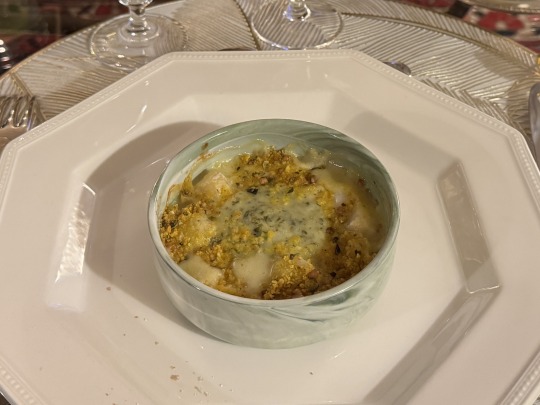




1 note
·
View note
Text
Etape tip-top

Si l'échappée de ciel bleu est un rare instant de beau temps, une échappée à vélo est toujours égale à une infinité de bonheurs et de lumières.
Sous une couverture nuageuse et sous la grisaille, la Grande Echappée en Côte de Nuits et en Hautes Côtes de Nuits a rassemblé 500 cyclistes aux regards lumineux et rayonnants : il y a ceux qui ont fait de l'itinéraire du jour un terrain d'entraînement sans modération, entre Nuits-Saint-Georges et Gevrey-Chambertin.
D'autres ont voulu en profiter un maximum en réalisant un contre-la-montre non chronométré, juste pour le plaisir d'être à bicyclette. En famille, entre amis ou en solitaire, ils ont découvert une étape tip-top.
Mention spéciale accordée aux signaleurs pour leurs nombreuses attentions à la mise en sécurité des cyclistes. Pour reprendre le propos d'un de nos collègues "Quand on aime, on ne compte pas."
Alors, vive le vélo à gogo, à volonté, ad libitum. In velo Veritas.
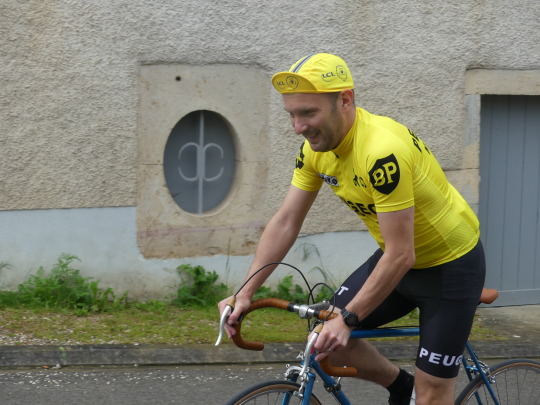
Vidéo à l'aide de ce lien
Album photo 1, album photo 2, album photo 3, album photo 4
Les photos partagées sur la page FB du Département de la Côte d'Or
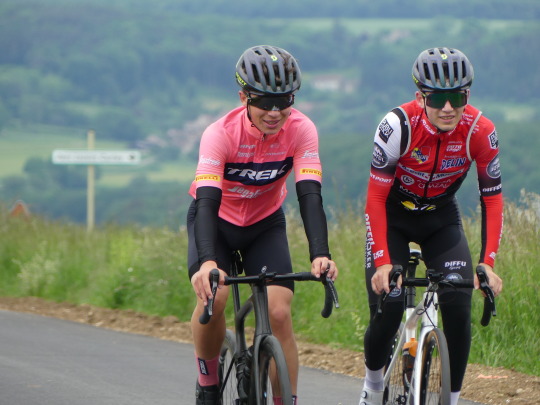

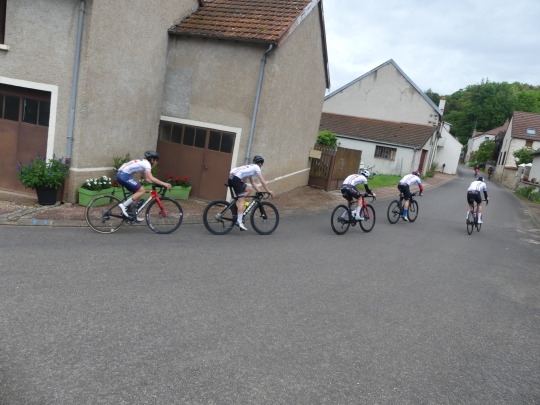
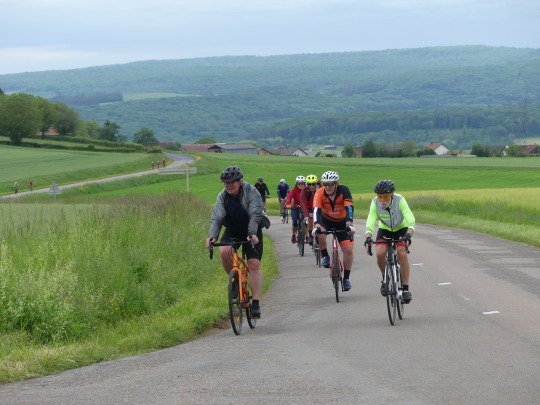




#nousportonslaflamme#tour de france 2024#tour de france#la grande échappée#terroirs cyclistes#terroirscyclistes#inveloveritas#echappée
0 notes
Text
DÉPRESSION AU-DESSUS DU JARDIN
Paris, le 26 octobre 2017
Sous la voûte étoilée du Grand Rex, Jane Birkin, à ciel ouvert, dans un dépouillement symphonique [oxymoron ?] laissant la part belle aux mélodies et aux lyrics ainsi qu'aux envolées instrumentales ad libitum, nous a montré que l'on pouvait chanter sur scène les ‘Amours des feintes’ sur des airs mélancoliques à souhait – The Saddest Music in the World –, en touchant non pas, peut-être, le cœur de cible (seule préoccupation des majors du disque), mais la cible en plein cœur.
A l'unisson du piano (et des arrangements, subtils) de Nobuyuki Nakajima – dont le toucher délicat semble être directement relié au souffle de l'interprète –, Jane, avec cet air qu'elle a de ne pas y toucher, nous remue profondément et nous condamne… à la joie.
L'unique dépression ressentie est bien celle qui, après le concert, nous raccompagne, ‘animal triste’, jusqu'au portail du jardin déserté. Seule Barbara savait faire ça aussi, chanter ses blessures et panser les nôtres, dans le même temps, curieuse alchimie… Et puis Birkin va vraisemblablement beaucoup mieux : sa voix sa silhouette retrouvées, la beauté de sa présence. Et parce qu'on l'aime, cela aussi nous rassure et nous fait immensément plaisir.
A ceux qui se demandent parfois si un disque (ou une set list) n'est pas trop down, s'il ne faudrait pas rajouter quelques up-tempi pour faire passer la pilule ou l'envie de se pendre, elle répond (du moins on l'imagine) entre deux silences habités : ‘Ne vous déplaise… Croyez-vous que ce soit bien divertissant de passer sa vie au milieu d'un déluge de fadaises ?’
En susurrant ses ruptures au miroir, la voix sur les pointes, elle nous parle de nous : de notre enfance, de cette adolescence évanouie dont Gainsbourg aura signé le soundtrack pour toujours ; mais elle nous parle aussi de nos amours fugaces ou de celles que l'on croyait éternelles et que le temps s'est acharné à décomposer. Elle convoque ses fantômes pour qu'ils rencontrent les nôtres et les épousent – noces de soie, de velours ou de flanelle – le temps d'un récital. Elle semble vouloir nous dire, Nouvelle Jane-Héloïse murmurant à l'oreille de qui veut ou peut l'entendre : ‘Tant qu’on désire on peut se passer d’être heureux ; on s’attend à le devenir.’
Merci Madame.
Philippe BRESSON

0 notes
Text
Coeur en liberté
Une voix et vois la voie Des vers sculptés Du coeur en liberté Musique des mots musique de la pensée Chœurs des âmes Souffle de l'esprit et du corps Dans les poèmes serpentent Des formes fixes libres ou prosaïques Ponctuation E muet ou sonore métrique et rime s'affirment ou s'effacent Le mouvement de l'esprit Dans une danse envoûtante S'enivre Vont viennent des formes des couleurs des lignes des rythmes L'essence Le sens les sens le double sens
La polysémie Polie s'est mis Au creux des vers Du poète Poly-sémite Poly-c'est-l'amie Revers et obvers Des insolentes odelettes
Combat Chasse à l'homme Qu'on bat Ad libitum
Courent le souffle court La cour et l'accusé Dans la cour du palais À la vie à la mort Haut et court "Valse le temps Valsent les hommes Dans l'ivresse de la vie Dans le vertige de la mort"
Vale!
0 notes
Text
Progressisme ( II ) : les rejetons maudits d'une doctrine perverse
Comme nombre des fausses avancées / vraies régressions qui désaxent notre temps, la faute initiale remonte à une croyance en la pérennité des idées ''des lumières'', certes remarquables en leur temps, mais que les progrès de la science ont toutes rendues caduques. On répète ''plus rien n'est comme avant'', mais on conserve leur cadre rigide qui paralyse l'esprit, interdisant ainsi au ''progrès'' de s'épanouir. ''Tout faux !''. Certes, la définition du progressisme a légèrement varié au fil du temps, mais depuis le début du xxe siècle, les idéologues progressistes croient que des politiques publiques peuvent conduire à un changement social positif (nous avons cité hier les plus catastrophiques), fut-ce contre la volonté des peuples, qui DOIVENT être guidés ''vers la lumière'' (sic !). Sans même nous en rendre compte, nous voici enfermés dans une ''maladie infantile du gauchisme''.
Le mot ''progressisme'' désigne un éventail de groupes de pression divers, pas toujours unis mais qui ont en commun de croire que les grands problèmes auxquels la société est ou serait confrontée (lutte des classes, cupidité, corruption, pauvreté, racisme ou violence), pourraient être supprimés par une action gouvernementale... ce qui a été démontré faux, depuis : un gouvernement complique tout, rend tout insoluble, et dépense beaucoup d'argent pour des résultats asymptotes à zéro... Car il ne faut pas oublier les ravages qui ont été commis au seul nom du ''progressisme'', ciment des forces qui soutinrent l’URSS stalinienne après 1945.
Le camp dit ''progressiste'', à l’époque de la guerre froide, était le camp des communistes (par opposition au camp américain, par eux dit ''réactionnaire et colonialiste'').Et en 1949, pour le 70e anniversaire de Staline, Malenkov voyait en ce monstrueux dictateur ''le guide de l'humanité progressiste'', ce qui devrait en faire réfléchir certains : les communistes occidentaux et leurs salopard-issimes de ''compagnons de route'' se disaient ‘’le camp progressiste’’. Il y eut même une ''science progressiste'' (animée alors par Lissenko et ses sbires... et de nos jours par Véran, Delfraissy et les leurs !) et une ''culture progressiste--galerie d'horreurs’’.
Et puisque nous avons cité les énormités qui ont fait de la ''crise du covid'' un sujet de fou-rire pour les générations futures (s'il y en a... car ils semblent vouloir gérer la ''crise ukrainienne'' de manière tout aussi ''progressiste'', ce qui ne peut déboucher que sur des catastrophes...),on sait aussi que les domaines où nos progressistes au pouvoir vont pouvoir se déchaîner en malfaisance sont liés à ce que Hollande désignait par ''lois sociétales'' (traduction en français : ''qui ravagent tout, à jamais'') : les lois scélérates sur la filiation, le feu nourri des partisans de ''l'inclusion'', la volonté de la maîtrise par l'homme de l'heure et des circonstances de la mort de chacun, qui doivent ''impérativement'' (?) être repris en main sur des bases ''progressistes'' (Tout cela est terrifiant ! J'aimerais être mort, pour éviter ça !).
1- Commençons par la filiation : tout ou presque a été dit sur les raz-de-marée d'insanités que déversèrent la Agnès Buzyn et leJean-Louis Touraine (si d'autres intervenants ont aussi proféré des monstruosités, aucun n'a atteint un degré de ''vis comica'' comparable à ces deux clowns !). Il faut psychanalyser leurs motivations, derrière leurs imbécillités. Par exemple, pour un progressiste, il n’y a pas le moindre déterminisme dans la procréation, puisque le sexe (garçon ou fille) ne serait, à ses yeux, que ''un genre'', que l'on peut décider, modifier, ou faire évoluer ad libitum. Et, disent-ils, ''la preuve que votre ''le naturel'' est le reflet d'une charge émotionnelle, morale et sociologique, c'est qu'aucune époque avant la nôtre ne s'était engagée dans la disqualification de tout lien naturel'' (comme aurait dit Madame Michu, ''Quand même... Faut oser'' !). Dans la ''logodiarrhée'' progressiste, ''une intention morale donne la naissance... que l'acte de procréation rend possible...'', ce qui explique (?) que, pour ces idiots dangereux pour l'humanité, ''Le Père peut être une femme, un oncle, une grand-mère'' ou une autre entité (sic !)'' , comme osait l'éructer la Buzyn. (Vous avez suivi ? Moi, j'ai compris que... ''Plus con qu'eux, tu meurs''!). Pourtant, notre Président-progressiste a récompensé cet assassinat de toute intelligence par une légion d'honneur sans majuscules : tout est permis, pour casser quelque chose qui marche vraiment bien, depuis... la nuit des temps !
2- Autre folie mortifère : l'inclusion. Les avatars du marxisme sont partout, dans notre monde en voie possible d'explosion terminale, protégés par des nécrophages nostalgiques de l'horreur, et le vocable ''inclusion'' est un synonyme (pour eux !) de ''Le Bien... mais en mieux’’ : ils disent qu'une chose est ''inclusive'' pour dire qu'elle est ''bonne''. Il n’est plus discuté que la destruction du sens des mots, comme le Novlangue dans ''1984'', est et reste le moyen d'action préféré des progressistes : l'inclusion, ce n'est plus tel ou tel élément isolé qui doit s'adapter au groupe, c'est tout groupe qui doit se fondre dans n'importe quel élément, sans autre raison que ''puisqu'on vous le dit'' ! Et si la multiplication de ces adaptations dites nécessaires rend l'exercice impossible, ''demerden Sie sich'' comme on ne dit pas en allemand !
L'inclusion est la mort de toute ''norme'', et elle précède en cela la mort de l'homme. ''Mort, où est ta victoire ?'', demandait Saint Paul (Cor. 2, 15). La réponse est maintenant connue : la mort de toute civilisation, donc de l'Homme, se trouve dans le progressisme et l'inclusion... ce qui est déjà très grave, mais devient odieux si on réalise que toute pensée dite ''inclusive'' (c'est-à-dire : bonne pour les seuls progressistes, mais effroyable pour tous les autres humains) ne peut exister que sous-tendue par un besoin frénétique de condamner, d'ostraciser, d'assujettir : l'inclusion ne peut exister qu'à travers et dans l'exclusion de tous ses opposants, réels ou potentiels. Un exemple ? Le 5 janvier dernier, notre Président-progressiste (qui se pique d'être ''inclusif'') a rejeté en des termes orduriers tous les français (''ses ouailles'' !) qui ne se plient pas à ses désirs les plus fous (et qu'ils ont raison de refuser, dans ce cas précis !). On pourrait donc ajouter que l'inclusion, outre qu'elle est exclusive, limitative, anti-transgressive par ses excès de transgression, et sélective vers la non-sélection, est violente : En résumé : ''tout le monde, il est beau et il est gentil... mais ceux qui ne sont pas d'accord, je les emmerde !''. Encore une de ces idées chrétiennes que GK.Chesterton disait devenues folles en ressortant du Purgatoire où la Gauche les avait enfermées... en les ayant fait passer de ''bonnes'' à ''mauvaises''. Comme... tout le reste !
3- Dernier sujet : l'euthanasie... sujet qui devient peu à peu inutile : de plus en plus souvent, les soins palliatifs permettent aux grands malades de mourir à peu près sans souffrances. Mais il refait surface. Pourquoi ? Ce n'est bien sûr pas un soulagement des malades dont il s’agit, mais le besoin pathologique d'établir que le droit de vie et de mort appartient à la ''Res Publica''. On fait croire qu'il sera entre les mains de médecins --dont on croyait qu'ils avaient vocation à guérir, pas à assassiner, même en conformité avec une loi scélérate de plus. Dans leur immense majorité, ils refusent l'éventualité d’être la main du suicide assisté (ou celle, tout aussi horrible, qui tue un bébé vivant et parfaitement viable dont la mère a un doute, soudain). Imaginez un monde où la ''blouse blanche'', respectée et souvent admirable, planterait la seringue de la mort... uniquement parce que le ''progressisme'' mortifère aura décidé que c'est un ''progrès'' (Sont-ils fous, idiots ou criminels ?), et qu'il faut donc imposer cette horreur à notre pauvre humanité.
A l’opposé, un Théodore Roosevelt, Président des Etats-Unis (1901 -1909) disait qu'il avait "toujours cru que le progressisme sage et le conservatisme sage pourraient un jour aller de pair !''. Mais ''Teddy'' Roosevelt, ‘’ami du progrès’’, était républicain... et intelligent, lui ! O tempora, o mores (traduction libre : ''Avant, c'était tout de même mieux !''). En France, pour qui a vécu la passation de pouvoirs de Macron à soi-même, le progressisme consiste à se faire la bise et à se papouiller les bajoues, même entre hommes, sous les lambris dorés des palais nationaux...
Mais dites-donc, les mecs... la pandémie, la transmission, les gesticulations dites''barrière'' et tout l'attirail que vous brandissez pour nous terroriser, ils sont où ? Je vais vous le dire : c’est réservé aux ''pauvres cons'', ceux qui paient mais sont confinés dans leur 75 m². Dans les palais de la nouvelle aristocratie (vous savez, les ''de Gauche'', grande famille dont les titres de noblesse remontent à 1793 !). Comme le chantait si joliment Jacques Brel, ''Faut vous dire, Monsieur, Que chez ces gens-là, On n'vit pas, Monsieur, On n'vit pas, On triche ... et, ajoutait-il : on compte... mais on n's'en va pas !. Mais enfin... on est progressiste ou on n'est pas ! Et chez nous, ''être progressiste'', ça se résume un peu à autoriser l’avortement jusqu’au neuvième mois (une idée-force de la mandature ''Macron Ier'') et à son prolongement-antidote logique, la légalisation de l’euthanasie, beaucoup moins coûteuse que les soins palliatifs, pour mettre la totalité de l’existence humaine sous l'autorité de l'Etat-Léviathan et de ses sbires cooptés... En d'autres termes : tout et n'importe quoi, pourvu que ce soit en rupture avec ''avant'' ! On n'en est pas sortis !
Sérieusement, et sans être méchant (ou alors... un tout petit peu...), imagine-t-on De Gaulle filer une pelle à Malraux... ou à Couve de Murville ? Alors... devant ce spectacle affligeant, il m'est revenu une autre pépite de la chanson française : le ''tube'' de Starmania chanté par la charmante Fabienne Thibault : ''On se caresse, on se cajole... On se comprend, on se console''. Et le vieil homme démodé que je suis a vite fait une petite prière pour que le reste des paroles, ''On dort les uns contre les autres, On vit les uns avec les autres'' me soit épargné un peu de temps encore ! Et dire qu'on trouve des français qui arrivent à se réjouir, à souscrire, et à espérer, encore ! Mais sur quels critères jugent-ils le ''méga bordel'' ambiant ? Le progressisme ? Ah ! Non, merci : on a déjà donné ! Trop. Et le Titanic s'enfonce...
H-Cl.
5 notes
·
View notes
Text
Ad Libitum I
Warnings: nonconsensual sex (series, to be warned later on)
This is dark!Loki and explicit. Your media consumption is your own responsibility. Warnings have been given. DO NOT PROCEED if these matters upset you.
Summary: You are face with the opportunity of a lifetime, however you might have told a rather big lie to get there.
Note: I promise my other series are still going. I have half chapters I’m chipping away at every day! For now I’ll post the intro to my first Victorian AU.
Thank you. Love you guys!
As always, if you can, please leave some feedback, like and reblog <3

‘For the consideration of one, Mister Everet Ede.
After a close and contented reading of your recent piece ‘The Oyster’s Wealth’ in Cornhill Magazine, I write you to present an offer upon your skills.
Your work does show potential and I believe, as an editor and an author myself, it would benefit both parties should I aid you in refining such talent. While your writing does prove adequate and at times, provoking, there is much a young writer might learn from one as esteemed and experienced as myself.
Under the marquee of my own publication, The Asp’s Tongue, and my name, I would extend to you an offer of residence and should it prove productive, a place upon my list of regular authors.
It was only two years ago that my journal opted to discontinue our bursary for writers but it is in my own purview, aside from those of my investors, that young minds require honing and it is upon my own coffers that I do make this offer of sponsorship for your development as an author.
Should you choose to accept, I would expect your arrival upon the first Sunday of June at my estate of Emerald Hills. You will come with all that is required for your education; nibs, ink, paper, et cetera, as well as any personal possessions required for daily existence. Your board will be allotted by manor throughout your residency. Aside from that, you would require only your wit and basic literary competency.
I expect confirmation of your acceptance by the last day of April so that I may have the manor prepared for your arrival. Tardiness in all matters will not be tolerated.
I anticipate a valuable and vibrant professional accord,
Lord Loki Laufeyson, Duke of Wynselm
Founder and Operator of Laufey’s Publishing’
You read the letter once more. The folds of the paper were deep and fragile, the corners curling from your repeated reviews. In the months since its delivery, you had memorised ever curlicue of its script. It was better than any letter of acceptance you’d ever received. The only flaw was the pseudonym across the top. One day, you hoped, it would be your true name that greeted you.
The coach rocked and you caught yourself against the side, jostled atop the hard wooden seat. You shifted in your stiff skirts and peeked out the window. There was still doubt. Still anxiety. You’d accepted the offer without a thought and without much explanation.
What would the great lord publisher think of you? A woman masquerading as a writer? Well, you hoped that he might overcome the shock and uphold his integrity. It was your work he had read. It was your words which had driven him to write. So why should your sex change the merit of your skill?
There was a sinking feeling in your stomach. It was a slim hope you had, truly. You expected him to laugh you back to your measly London apartment like all the other editors you had ever dared face beyond the stain of your inkwell. Had this all been for not? Another prospect dissolved by that feminine curse?
Besides, even if you were a man, the Duke was infamously misanthropic. It was reported in the papers that he hadn’t left Emerald Hills in several years. That he had grown cynical of society, not so much as submitting a sentence to his very own periodicals. So it was with great surprise that you’d received his letter and with greater hesitation. His reputation was not one of a fond patron but rather a unyielding despot.
Yet it was an opportunity you did not expect to ever occur again, so you leapt, without thinking, and now your fear bubbled in your chest. To have come all this way and to be told what you’d always been told. To be denied again. In the flesh, you could not be Everet Ede, you could not hide behind your pen. Perhaps his own penchant for artifice might soften his rigid spine.
The manor stood on the highest hill in Wynselm. The gates were locked and a solemn doorman appeared from a small shed to open them. You pulled the curtain shut, afraid you would be found out before even breaking the threshold. The coach rumbled up the winding and steep path and stopped just before the broad stone steps.
You peeked out as the driver stepped down from his perch. You waited a moment, watching the front doors of the manor. It seemed as if the entire place was dead. Abandoned, even. The driver opened your door and offered his hand to help you down. Though his service was the cheapest you could acquire, his manners suggested otherwise.
He unloaded your trunk as you clutched your valise. You thanked him as he set the heavy luggage beside your dark skirts and you offered him a coin from your purse. He accepted with a toothy smile.
“Should I wait and help you carry it in?” He asked.
You considered the offer. It might be best if he tarried in case you were swiftly dismissed. What would you do if you were stranded here? And yet, you were determined not to be turned away. Your best option might be to force your presence upon this man.
“No,” You answered staunchly and pushed your shoulders back. “You’ve been a great help, sir. You should hurry back to the city.”
“Miss,” He removed his hat. “Good day to you.”
“And you,” You nodded and watched him climb back up onto his seat.
He snapped the horse into action and their hooves clopped around and down the path until you could no longer see them. You gripped your valise even tighter and turned to the manor. The doors suddenly shifted and a man in a plain grey suit appeared. He pushed both open and stood aside as he waited silently.
You heard footsteps from within, the tap of leather sols upon the wood. A lithe figure emerged from the shadows and the sunlight lit his pale skin. His dark hair was pushed back so that his curls gathered behind his head and his high, starched collar made his features seem even sharper.
He stopped sharply at the top of the stairs and blinked at you. He peered around and squinted, slowly stepping forward to descend the steps. He stood straight across from you, a brow arched as he stared you down.
“Are you lost? I fear you sent away your valet much too soon, madam.” He said.
“My lord, Mr. Laufeyson?” You ventured.
He frowned. “Everet is a rather odd name for… a woman.”
“My apologies for my deception but you must understand as an editor yourself, a woman’s name doesn’t sell stories, does it?” You let out a shaky breath. “Not that I think it should matter when my physical attributes have little bearing on my writing.”
“Even so, I do value honesty in my writers. Foremost. A lack of such in life might reflect deceit on paper.” He challenged. “And I am not equipped to house… a woman.”
“Women hardly require more than a man. Often less.” You countered. “You made an offer on the grounds of my work, I accepted on the same. I see no reason why it should be an issue. I am determined, would have to be to have a story published, devoted to say the least, and by your own words, a competent writer.”
“I did not… I was not aware…” He sighed. “You can’t expect-- After being so underhanded… How could… I cannot…”
He cleared his throat and glanced over his shoulder at the man in the grey suit.
“I’ve taken two coaches and train. I’ve packed up my livelihood in this trunk, I’ve been nothing but honest other than… my true name. You cannot claim my work as ingenuine nor my intentions. I’ve come here to write.” You declared. “I see not how my sex should preclude me from these matters. Would you argue inadequacy based upon my physical stature after proclaiming me capable previously? Sir, I would argue that should suggest a lack of honesty on your part. Not mine.”
He tilted his head and his chin jutted out in irritation. His slender fingers ran the length of his jacket and fiddled with the button.
“Well, you certainly speak like a writer.” He said. “Very well. We shall see what we can mold out of you.” He gestured to the man in the grey suit. “Horace.” He nodded to the trunk. “But do not think my standards shall bend upon your favour, madam.” He warned as the man came down to lift your trunk, barely able to drag it up the steps. “Oh, and your real name, to begin with.”
You recited your name and he spun without acknowledgement. He preceded the man he called Horace through the doors and you hurried forward to grab the other end of your trunk, your valise clutched in your other hand.
Inside, the large foyer was barely lit by the candelabras in the corners. The chandelier above was dark and dusty. You struggled to keep hold of the trunk as you followed Horace. He set down his end and bid you to do the same.
“Madam, please, I will get proper help,” He waved to the lord of manor, already halfway up the staircase. “You might leave your valise and both will be deposited in your rooms.”
“Thank you, sir,” You said before you turned to hurry up behind Lord Laufeyson.
“Your rooms are in the north wing, mine in the south. You needn’t venture very far from your own. I have a maid in the kitchen who will set out meals and Horace oversees our maintenance and the cleaning servants when they are present.” He began. “You will only be required in the bureau where you will take your lessons.”
“Yes, my lord,” You felt completely out of place. You weren’t used to such an immense house, let alone such a prestigious host.
“Sir will do just fine,” He corrected. “Do you type, madam?”
“No.” You admitted. “I hand write my stories and they are often transcribed by the journals.”
“Mmm, well, then we should add that to the schedule.” He remarked. “I have written out your daily itinerary as you will find in your rooms. “You will wake at six, take your breakfast by the next hour as you will be expected at seven for your first lesson. Lunch will be at noon, you will be permitted recreation at three, tea the following hour, and we shall add typing practice to your evening exercises.”
“Sir,” You said as you followed him.
“This is the bureau where your lessons will be,” He opened a single door. “That…” He looked to the pair of doors at the end of the hall. “Is the library. It will be unlocked during your recreational hour though you might visit the gardens if you choose.”
“Yes, sir.”
“Did you attend college, madam? I understand they offer schooling for women now.”
“No,” You answered plainly. “I finished public schooling and the rest I did upon my own.”
His eyes strayed in his thoughts and he hummed.
“Well, that sort of discipline is promising, I suppose,” He said. “And you are… unmarried?”
“Yes.”
“Ah, to be expected. A husband shouldn’t allow a wife to live unaccompanied with another man. And yet, an unmarried woman should not allow herself the same discrepancy,” He remanded. “There are proprieties which must be attained. You understand?”
“Sir, I am not wholly unaware of our social bounds. I’ve travelled to write. I haven’t any interest in men to this point and I highly doubt this circumstance should change that.”
He gave a half-chuckle before he caught himself.
“I always found you urban poor had trite mouths,” He sneered. “The factories do allow for unfortunately low association. You lot do sell your morals for a penny.”
“I see no immorality in work,” You argued. “In fact, the poor can rarely afford immorality.”
He looked at you, sternly.
“Let me show you your rooms and you might accommodate yourself to the arrangements,” He gestured you back down the corridor.
Again, you trailed behind him. The walls were lined with portraits, their frames powdered with dust and canvas washed out with age. He must’ve lived a rather small existence in this immense place.
He stopped before another door, his fingers wrapped around the handle then he recoiled. He reached into his jacket and slipped out a key with a black ribbon threaded through its loop. He held it out to you.
“These are your rooms. Keep the time. It is late. At four I expect you to take tea in the dining room. The cook should have it upon the table by then.” He watched as you reached to take the key. “When you are finished, our first lesson shall commence in the bureau. Come prepared with a manuscript in hand. I trust you did not come without forethought, especially considering… well, I shall excuse you to acquaint yourself with your quarters.”
He bowed his head, his spine rigid and straight. He sidestepped you and you listened to his hard soles on the wooden floors. You turned as his silhouette disappeared around the sparsely lit corner, the glow of candles flickering along the columns of the rails that overlooked the foyer.
You unlocked the door, your hands unsteady as your nerves remained riled. You’d overcome the first obstacle but this man seemed greater than any challenge you’d known before. Stiff-lipped editors, boastful male writers, dismissive reviewers; you’d faced every kind of foe.
You shut the door softly behind you, the click made you jump. You were pleasantly surprised to find it the room with the least dust. The windows were open and the curtains were freshly pressed and hung. The bed matched in its tidiness and the roll top desk against the wall was faced with a leather-cushioned chair.
The afternoon sun streamed in enough to light much of the room. Tall candelabras stood on four feet in the corners opposite of the bed. An oil lamp sat on the desk and a smaller candle holder sat on the table beside the bed. A small stool with an embroidered cushion was nestled in the corner and a chair in the French style peered out the far window.
You turned and faced the vast portrait of a man and woman. The former was silver-haired and staunch in his bearing, the woman was seated and gold waves were confined atop her head as a few ringlets framed her face in a style favoured by the previous generations. You tilted your head as you admired the artistry. It was almost as if the elegant couple was truly there before you.
A knock came at the door and you went to it. Horace was there with the man who had opened the gates. They dragged in your trunk and placed your valise at top with overly cordial ‘my lady’s’ in your direction. You wanted to snicker at the undeserved address. You thanked them and they refused a coin from your purse. You were thankful for that as you hadn’t many left.
You took your valise to the bed then returned to the trunk. You unbuckled the straps that held your trunk closed and tossed the lid open. The monstrosity was older than you. You’d bought it used. The lining was torn and most of it gone. You took out the stacks of paper sheathed in leather and rolled up the lid of the desk. You left them there and unpacked your pens and inkwell.
You sat and allowed yourself a breath. You tried to calm yourself. You slowly unwound the strap of the first folder and shuffled through the leaves. There was the story you’d written about the widow left homeless by her dead husband’s gambling debts. The other about the officer who finds himself by a foreign people.
Then there was that one which you had yet to show any. The one which told the story of a woman; a fraud; a liar. She pretends to be a true lady but is found out. She is tried before the county though she never stole nor harmed anyone. Tried upon her birth and nothing more. You tucked that one away and set aside the one about the widow. Nothing so novel but good enough, you supposed.
You reached to your belt and checked the watch that dangled from it. Like the trunk, it was previously owned by another. It made you want to write a story, a fantasy of its former owner. Of how the initials etched into its back had come to be near indiscernible beneath a series of frantic scratches.
3:37. You recalled Lord Laufeyson had said tea was at four. Not much longer. Barely enough time to ready yourself for his frigidity. Oh yes, he was the very modicum of Victorian temperance. How very dull.
#loki#dark loki#dark!loki#loki x reader#dark loki x reader#dark!loki x reader#victorian au#au#fic#series#ad libitum#marvel#MCU#dark fic#dark!fic
387 notes
·
View notes
Photo




Mercredi soir
Les routines s’installent si facilement : plage, balade les pieds dans l’eau, déjeuner dans un autre sympathique restaurant-club de plage, Le Poulpe, puis baignade, sieste, cueillette de bébés coquillages, rafraîchissements en front de mer, et dîner au bord de la piscine de nos amis H et S. Après le repas, vautrés sur des canapés, nous nous sommes mutuellement fait découvrir (sur Deezer connecté à la chaîne hifi) des chansons et artistes qui nous émeuvent. Que souhaiter de mieux, sinon que ces heures sauvées durent, durent, ad libitum…
3 notes
·
View notes
Text
Iris Publishers - World Journal of Agriculture and Soil Science (WJASS)
Nutrient Intake, Fermentation, Digestibility and Growth Performance of Barbarin Lamb Supplemented with Sweet Lupin
Authored by S Abidi

In Tunisia, particularly in the arid and semi-arid zones, climatic conditions have caused the degradation of rangelands leading to a chronic forage deficit and a nutritional imbalance in animals, particularly in sheep and goats. Thus, energy and / or nitrogen supplementation has become essential to maintain these animals and ensure the expected performance. For this reason, Tunisia has resorted to the import of raw materials including soybean meal, barley and corn [1]. However, fluctuations in their prices on the world market are negatively affecting animal nutrition industry. Our country imports annually, over 300,000 tons of soybean meal at a price of 1.2dt / kg [2]. Similarly, these imported raw materials are unstably available on the Tunisian market which can affect the profitability of farms and alter the sustainability of animal production sector in Tunisia. As a result, several attempts to replace these foods, including soybean meal, have been considered by researchers. Protein crops (Lupine, faba beans and peas) are good alternatives to soybean meal because of their high crude protein content. However, despite their good nutritional quality, their use in animal nutrition is currently limited due to the presence of anti-nutritional factors (Faba bean tannins, lupine alkaloids) and their fluctuating availability on the market (limited forage legume crops). Thus, the main objective of this study is the evaluation of the substitution effect of soybean meal by sweet lupine on the ingestion, digestion, growth and meat quality in Barbarine lambs.
Materials and Methods
Animals
Twenty-four six-month-old Barbarine lambs were selected. The initial live weight averaged 23 kg. These animals were transported to INRAT headquarters. They were acclimated for 4 days to new housing conditions. Lambs were weighed than divided into three equal groups. All animals received oat hay ad libitum and concentrate. the first group received CC1 containing 75% barley, 22.5% soybean meal and 2.5% CMV, whereas the second received CC2 containing lupine as a substitute for soybeans in term of CP to be iso-nitrogenous with CC1. The third group received intermittently CC2 and CC3 which contain only barley and CMV. Animals have undergone a growth period (80 days) followed by a digestible period (10 days).
Sampling
During growth period, average daily growth was assessed through weighing animals biweekly. At digestible period, lambs were housed individually in metabolic cages and were allowed three days for acclimatization to new conditions. Animals received weighed amounts of corresponding feed. A 7-day faecal collection period started on the following day. After weighing the amounts of fresh feed, refusals and faeces, samples of each were taken daily. Part of each sample was used for DM determination and the other part (20% of the weight of the fresh refusals and faeces) was stored at 4 °C for hay and concentrates or at – 5 °C for faeces. Urine was collected in plastic recipients containing 100ml of a 10% sulphuric acid solution (v/v) to maintain pH below 3. After weighing, an aliquot (10%) corresponding to each animal was taken and frozen (- 20 °C). In the last day, pooled samples of individual feed refusal, and faeces were dried at 50 °C; ground through 1 mm screen then stored pending analysis. Pooled samples of urine were stored in the freezer (- 20 °C) until analyzed. Rumen fluid was taken in two consecutive days to measure pH and ammonia content and to determine protozoa number.
Analyses
Feed, refusals and faeces samples were analyzed for dry matter (DM), ash and crude protein according to AOAC [3]. They were also analysed for (NDF, ADF and ADL) [4]. Urine was analyzed for Kjeldahl nitrogen [3] and allantoin concentrations measured using a colorimetric method. Urinary excretion of allantoin (Y, mmol/d) was used to calculate microbial purines absorbed (X, mmol/d [5]. Rumen fluid samples were analyzed for NH3-N [6].
Statistical analysis
The statistical analysis of the results was performed using an analysis of variance according to the model: Yijk = μ + Ai +εi.
In which μ= arithmetic mean; Ai = the effect of diet (i= 1,2 or 3) and εi is the residual experimental error. Data were analyzed using the ANOVA procedure. All statistical analyses were carried out using the GLM (general linear model) procedures of SAS Package (1987). Differences between the means of all the analyses were analyzed using the LSMEANS procedure.
Results and Discussion
Nutrient contents of feeds are presented in Table 1. Soyabean meal is greater in CP than lupine, while the opposite trend was observed for NDF, ADF and ADL.
Diets intake and digestibility are shown in Table 2. Results revealed that the nature of the additional protein source did not affect feed intake (P> 0.05), which corroborates with results reported by El Maadoudi [7] and El Maadoudi and El Housni [8]. The level of hay ingestion considered similar between the three groups reminds us of the result reported by Ephrem et al. [9]. This could be explained by the importance of the nutritional quality of protein sources and the tolerance of sheep to lupine alkaloids. Nevertheless, our results are contradictory to those reported by Lestingi et al. [10,11] by testing the replacement of peas and faba beans. In addition, proteins source did not reveal a significant effect on digestibility of MS, MO, MAT and NDF (P> 0.05). The amount of DCPi was significantly affected (P = 0.0003). Purroy et al [12] did observed significant differences in DM, OM, CP and fiber digestibility’s by replacing soybean meal with lupine seed in lambs. The incorporation of lupine into different quantities improved digestibility’s of DM, OM and cellulose without affecting those of NDF and ADF [13]. Lupine had no significant effect on their average daily gain (ADG). This result agrees with those of many trials carried out on the replacement of protein seeds by lupine which revealed comparable digestive uses between diets [9,11,14,15]. Moreover, Facciolongo et al. [16] found that supplementation with soybean meal and lupine induced similar ADG, while Lestingi et al. [10] showed low weight gain in animals fed lupine diet compared to those which consumed faba beans. We note that although the 3rd group received half of the quantity of lupine consumed by the 2nd one, the corresponding lambs were able to have similar and even better ADG than the others. This leads us to think about the concept of food efficiency. It seems that these animals were able to optimize their efficiency to transform food resources into meat to reach same weight as the others. The nitrogen balance and microbial synthesis are shown in Table 3. It appears that all animals had positive balances. However, a significant variation in the amount of nitrogen intake and retention was observed in the 3rd group in comparison with the two others. This difference is explained by the variation of the ingested quantity of the concentrate. On the other hand, by correcting the retained nitrogen to the nitrogen intake, the nitrogen balance was similar for all diets, which confirms that animals had the same nitrogen use efficiency. Moreover, similar CP digestibility reinforces this finding.
The total amount of purine and the amount of microbial nitrogen were not influenced by the source of supplemented proteins (P> 0.05), which is consistent with the lack of effect on the CP digestibility. In accordance with our results, Yu et al. [17] found no significant differences between purine and microbial nitrogen concentrations in lambs supplemented or not with blue lupine or faba beans.
Table 4 presents the different fermentation parameters. Our study showed that the average pH of rumen juice was affected by the diet (P < 0.05). pH corresponding to the 2nd group (6.25) exceeded significantly that of the 1st group (6.07), but no significant difference was detected between pH corresponding to the 3rd group (6.13) and the others. Brand et al. [18] reported pH values ranged between 6.4 and 6.3 in castrated rams fed a lupine diet. Rumen ammonia level was affected only by diet (P > 0.05). The highest concentration was observed in daily lupine fed lambs (23.9 mg / dl). White et al. (2002) found that ruminal ammonia concentration was higher with lupine incorporation rate of 70% than with 35%, which corroborates the high ammonia level in animals receiving lupine daily and the low one in animals receiving lupine intermittently. Protozoa enumeration revealed a significant difference between diets. Animals belonging to the 2nd group had the highest number (15.3 * 105 / ml) whereas those of the 3rd group had the lowest one (11.7 * 105 / ml). This could be explained by the corresponding ammonia concentrations in the rumen since a large population of protozoa is generally associated with a high concentration of ammonia in the rumen [19,20].
Conclusion
It can be concluded that lupine grains can substitute safely soybean meal in diets of Barbarine lambs. The distribution intermittently of lupine seems to be a double interesting alternative to soybean meal. It decreases lupine quantity and therefore reduce feeding cost
#agriculture#Agriculture and Soil Science#journal of agriculture#Inter National Agriculture Science#soil science#Food science
2 notes
·
View notes
Text
Clé de douce pour cleptomane

Se pourrait –il ?
Oui,
Se pourrait –il ?
Qu’une porte reste à jamais ouverte ?
Que des clés n’existent que pour déverrouiller ?
Que nos fenêtres ne soient jamais closes ?
Que sans fard les visages s’exposent ?
Que tombent les masques de nos qualités empruntées ?
Que de l’oubli, émerge tous les bonheurs passés ?
Qu’en un mot notre vérité soit assimilée ?
Quelle est cette clé ?
Ce pied de biche ?
Ce démaquillant ?
Ce révélateur ?
Ce vif esprit ?
Quel est ce mot ?
Sésame des Sésames de nos âmes repliées.
Ce secret n’a-t-il pas un vocable connu, mais tu ?
Vous tous, qui le connaissez depuis toujours,
Convoquez-le !
Invoquez-le !
Criez-le !
Faites fi de la gêne,
De la timidité.
De la peur,
De la pusillanimité,
De vos terreurs,
Alors !
Chantez,
Dansez,
Riez,
Créez,
Rêvez,
Et dites simplement : Au commencement était le verbe « Aimer »
Et répétez ad libitum
Aimer,
Aimer,
Aimer,
Puis conjuguez à tous les temps,
Passé,
Présent,
Futur,
Conjurez par tous les temps,
J’aimais,
J’aime,
J’aimerai,
Et de l’incantation,
De ce simple mot
Qui s’incorpore,
Naîtra la JOIE,
Notre souverain bien,
Le sens de nos vies,
L’objet unique de notre raison.
AD-raison
42 notes
·
View notes
Text
The Effect of Salinity Acclimation on the Upper Thermal Tolerance Threshold of the European Green Crab
Abstract
Fluctuations in salinity and temperature, among other varying environmental conditions, are stressors in estuaries and may work together to alter the physiological response of organisms that inhabit such environments. Laboratory assessments that investigate how animals respond to multiple environmental stressors can provide an ecological framework for understanding physiological performance across varying conditions. In this study, European green crabs, Carcinus maenas, were collected from Seadrift Lagoon, California, USA (37°54′27.82″N, 122°40′19.56″W) and were lab-acclimated at three different salinity concentrations typical of many estuaries: 15, 25, and 35 PSU at 12 °C (± 1 °C). After acclimation, crabs from each salinity treatment experienced a temperature ramp of 2 °C every 30min until they reached their critical thermal maxima (CTmax). Crabs held at 15 PSU acclimation treatment died at significantly lower temperatures than those acclimated to 25 PSU, demonstrating that the upper thermal tolerance of C. maenas is decreased at lower salinities. Hence, crabs in the northeast Pacific, which are limited to estuarine and brackish waters by marine predators, may be physiologically limited from further expanding their southern range boundary due to the effect of increased temperature on physiological performance. This work took place in March, 2013 and highlights the importance of examining the effect of multiple stressors to understanding what factors may limit or enhance range shifts.
Keywords: Carcinus maenas; Multi-stressor; Salinity acclimation; Thermal tolerance; Abiotic resistance; Invasive species
Introduction
Ecophysiological research has historically focused on altering one abiotic variable at a time to measure the physiological response to that variable. However, examining how multiple stressors affect organisms provides a more holistic view into factors that govern distribution and abundance of species [1-3]. The intersection of fresh and salt water, coupled with thermal fluctuations typical of estuaries can affect physiological performance, leading to geographic distribution limitations of estuarine organisms Sokolova et al. [4]. Additionally, along the west coast of North America, the estuarine distribution of Carcinus maenas has been attributed to predation by a larger, aggressive native crab Hunt & Yamada [5].
Owing to their broad thermal and salinity tolerance, C. maenas has successfully invaded coastal habitats of four continents, including the west coast of North America [6-8]. In addition, C. maenas can survive and reproduce in a wide range of salinity concentrations because they are proficient osmoregulators [9]. Nagaraj [6] found that salinity had little to no effect on developmental rates of C. maenas; however, zoeae kept in high salinity treatments (25 and 35ppt) had the greatest survival rates at the lowest experimental temperature, ~10 °C [6]. While these studies are informative, they do not necessarily reflect the dynamic abiotic environment that C. maenas inhabits.
In the eastern Pacific, C. maenas is preyed upon by native crabs, limiting their habitat use of the open coast, consequently forcing C. maenas to occupy areas with greater temperature and salinity fluctuations [5]. As such, C. maenas populations generally reside in upper estuaries, which are characteristically warmer and less salinated [5]. For C. maenas specifically, exposure to lower salinities leads to increased oxygen demand (i.e. increased anaerobic metabolic rate) as a means to offset the concomitant increase in hemolymph pH, which in turn affects the hemolymph’s O2 affinity [10]. The variable salinity concentration of estuaries in conjunction with their often warmer conditions [5] may combine to limit the ability of C. maenas to mount robust heat stress response, thus lowering the upper thermal tolerance, despite it being a euryhaline hyperosmotic regulator. Ionic stress combined with heat stress has been investigated in larval C. maenas; however, the effect of variations in salinity concentrations on adult crab upper thermal tolerance has yet to be investigated. To better understand how variations in salinity affect the upper thermal tolerance of adult crabs, animals were acclimated to three different salinity concentrations common to estuaries and then were subject to acute heat stress. Given that C. maenas is an osmoregulator, such that decreased salinity increases metabolic demand, we hypothesized that a reduction in salinity would circumvent the ability of C. maenas to mount a robust response to heat stress, thus reducing organismal thermotolerance.
Methods
Sampling, maintenance, and salinity treatments
Male and female Carcinus maenas were collected from Seadrift Lagoon, Stinson Beach, California, USA in August 2012, and transported to Portland State University, Oregon, USA. The crabs were temperature acclimated at 12 °C (± 1 °C) and 30 PSU for approximately 210d prior to the salinity acclimation phase. Three groups were then formed via random selection and acclimated to 15, 25, or 35 PSU, encompassing the salinity conditions where they are typically found (~10-35 PSU) [11] for 56d. Each salinity-controlled treatment group was held in a separate, self-sustaining, recirculating-water, temperaturecontrolled aquarium table system in artificial sea water (Instant Ocean) treated with 20mL of a nitrogen reducer (AmQuel) per approximately 151.42L of water, when nitrogen was high. System salinity was held within ± 1 PSU of the target salinity concentration for each treatment group by thrice weekly salinity measurements and additions of deionized water as needed to maintain the respective salt concentrations. The crabs were fed a medley of squid, fish, and mussels ad libitum, once per week.
Heat ramping
Members of the C. maenas sample population (n = 15 per treatment) were randomly selected from each salinity treatment and placed in recirculating and continually aerated water bath (Lauda RM6 MGW) filled with aquarium water from their acclimation tank. The bath was then ramped up by 2 °C every 30min, beginning from a base temperature of 12 °C ± 1 °C Kelley et al. [7]. The temperature at which each crab expired was monitored with a Vernier thermometer probe (± 0.1 °C) and recorded. Critical thermal maximum (here after CTmax), a standard measure of temperature-related animal death, was determined via a set of criteria verified by physical examination [7]. If the specimen was unresponsive to manipulation and could not right itself, it was held just below the surface of the water and examined for signs of respiration, i.e., water movement via the activity of the scaphognathite Crothers [12]. If cessation of respiration lasted for longer than 30s, the specimen was considered physiologically deceased and was removed from the water bath. Upon each crab’s death, we removed the specimen and recorded its treatment group, sex, temperature at death, and carapace width. Heat ramping continued until all of the experimental animals expired.
Statistics
To determine that the assumptions of normality and homoschedasticity were not violated, the Kolmogorov-Smirnov Goodness-of-Fit Test (P = 0.57) and Bartlett’s test for equal variance (P > 0.1) were used (Graphpad Prism) prior to analysis. Analysis of Covariance (ANCOVA), followed by Tukey’s Multiple Comparison Test were employed to determine whether salinity (fixed) and crab size (continuous covariate) affected the upper thermal tolerance of the crabs (Minitab 17). To further explore the relationship between carapace width (CW) and CTmax, a linear regression was used (Graphpad Prism).
Results
The three salinity treatments differed in their mean CTmax values (Figure 1, Table 1, ANCOVA, F(2,42) = 4.16, P = 0.02). The mean differences in CTmax between 15 PSU and 25 PSU, 15 PSU and 35 PSU, and 25 PSU and 35 PSU were -2.6, -1.3, and 1.3 °C, respectively. Tukey’s Multiple Comparison Test revealed a significant difference between the 15 PSU and the 25 PSU samples: the average CTmax of the 15 PSU sample (32.5 °C ± 0.6 °C) was significantly lower than that of the 25 PSU sample (35.0 °C ± 0.46 °C, Figure 1). The 35 PSU treatment was intermediate, having an average CTmax of 33.7°C ± 0.6, and did not significantly differ from the CTmax values of the other two salinity treatments. CW also significantly affected the upper thermal tolerance threshold, with lower CTmax for larger crabs (Figure 2: r2 = 0.2, y=-0.1*x + 41; ANCOVA. F(2,41); P = 0.008).
Discussion
We found that adult crabs that were acclimated to low salinity concentrations showed greater susceptibility to rising temperature. Crabs acclimated to lower salinity had a significantly lower CTmax than crabs acclimated to 25 PSU, supporting our initial hypothesis that lower salinity environments can negatively affect the upper thermal tolerance of adult Carcinus maenas. This finding was in accordance with a study that examined the effect of salinity acclimation on thermotolerance and larval development distribution of larval C. maenas Nagaraj [6]. Similarly, in another study, temperature interacted with salinity, together affecting larval development duration and attachment of the barnacle Balanus trigonus Thiyagarajan et al. [13]. Variations in salinity and temperature significantly modified the development of Nile tilapia, Oreochromis niloticus, but the interaction of the two variables modified development in unpredictable ways, with growth rates peaking at different temperatures as salinity changed Likongwe et al. [14]. A decrease in salinity concentration was also shown to significantly limit the range of temperatures tolerable by the bivalves Mercenaria mercenaria and Crassostrea virginica, for both survival and larval development Davis and Calabrese [15].
Our CTmax data suggest that after acclimation to a low salinity (15 PSU), temperature tolerance decreased significantly, offering an additional abiotic variable that may further limit their distribution. Hence, a large expansion south to warmer waters along the western North American coast seems unlikely This observed decrease in temperature tolerance implies that although C. maenas is capable of tolerating low salinities, it is metabolically taxing for them and could synergistically alter their ability to physically cope with thermal stress. Southward expansion of east coast C. maenas populations has been documented to be limited by native crab species found in estuaries De Rivera et al. [16], our data suggest that salinity and temperature in concert with predation together limit southward expansion. Together these multiple stressors may determine the potential for future range expansion of C. maenas.
A recent study found a significant relationship between environmental temperature and body size across this population of C. maenas, with larger crabs occupying areas of cooler temperatures, a phenomenon known as the temperaturesize rule for ectotherms Kelley et al. [17]. Here, we have shown that larger crabs tend to have a lower overall thermal tolerance threshold than smaller crabs (Figure 2). This study provides further evidence supporting the temperature-size rule in that large crabs that inhabit warmer, hyposaline water are more susceptible to heat stress, such that temperature acts as a selection force against larger body size.
Our study’s findings add to the body of literature supporting the conclusion that multiple stressors combine synergistically and may affect geographic range expansion and possibly overall success; however, the exact effects and synergistic relationship differ across species Todgham et al. [18], Crain et al. [1], McBryan et al. [19], Todgham and Stillman [3]. Together these studies, and others, suggest that the interaction between salinity concentration and temperature on aquatic life is not purely additive, and that more research is needed on multiple environmental stressors acting in one system, especially to predict the geographic distribution of species as their ranges shift due to climate change or biological invasion. Because of overwhelming evidence of climate change, it is important to consider the implications of inevitable further rise in temperature and changing estuarine salinities on native and non-native marine species in the near future Kelley [20], Sorte et al. [21]. The predicted change in riverine input could alter salinity and temperature along with pH, and could be modeled to understand potential future distributions. Life at low salinity levels and high temperatures becomes increasingly difficult for native and invasive species and can cause northward range expansion of C. maenas Kelley et al. [3], Hunt and Yamada [5]. It is important to understand the many abiotic factors can affect C. maenas distribution in order to predict future range expansions and possible ecological and economic effects of a non-native species on native marine animals and delicately balanced ecosystems.
Conclusion
This study documents that other environmental factors influence the upper thermal tolerance of the invasive Carcinus maenas, the European green crab. Understanding the role that dynamic environments play in regulating the physiological tolerances of invasive organisms is critical to gaining insight regarding the ecology of biological invasions. This research underscores the importance of, and the need to conduct studies that investigate the interplay of multiple environmental stressors on the physiology of non-native species.
To Know More About Journal of Oceanography Please Click on: https://juniperpublishers.com/ofoaj/index.php
1 note
·
View note
Text

Masque-fétiche et perversion politico-sociale
Ce que le pseudo-psychanalyste ne peut pas piger (car dans la mesure où son sujet est pris dans le Discours Universitaire, il n’est pas seulement mauvais psychanalyste mais en vérité il n’est pas-du-tout–psychanalyste), ce sont les implications de l’affirmation de Freud selon laquelle "la société" procède du refoulement, et pas l’inverse, assertion qui n’est pas sans questionner le rapport du sujet à "son" Autre selon la structure perverse, en tant que la perversion participe du champ social en surdéterminant la place du sujet dans le discours courant...
Rappelons qu’en 1923, Freud revient sur le conflit entre la "réalité de la perception", dont l’affirmation est que la femme ne possède pas de pénis, et son démenti (Verleugnung) opposé en retour par le moi de l’enfant, pour qui cela n’est pas vrai, liant ainsi la structure de la perversion à la question du fétichisme...
La perversion ne relève dès lors ni du refoulement (Verdrängung) ni de la forclusion (Verwerfung), mais du déni (Verleugnung), c’est-à-dire d’une double position où il y a d’une part la reconnaissance que la mère n’a pas le phallus, et d’autre part la négation de cette reconnaissance, afin qu’il puisse continuer à croire que la mère l’a, par la médiation du fétiche comme phallus déplacé. C’est ainsi que pour Freud, le sujet se rambarde contre l’horreur de sa propre castration, en maintenant la mère phallique au cœur de son fantasme...
La perversion apparaît dès lors comme une manière commode de dénier la différence sexuelle: des femelles auraient le phallus...
La matrice du fantasme pervers permet au sujet de répéter ad libitum la scène primitive où il atteint la jouissance par l’intermédiaire du fétiche comme dernière chose vue avant de constater l’absence du phallus, Freud n’omettant pas de préciser que le fétiche n’a aucunement besoin de ressembler aux organes génitaux, ni aux autres objets qui reproduisent la forme du pénis, l’objet prenant valeur de jouissance est rarement emprunté au corps féminin lui-même, mais plutôt à ce qui le borde, l’entoure, l’enveloppe, ou encore le prolonge. Le fétiche n’est pas le phallus, mais le voile derrière lequel se laisse dessiner la possibilité de sa présence cachée...
Voilà ce que precise Lacan, dans La Relation d’objet, le 27 février 1957: «Toutes les perversions jouent toujours, par quelque côté, avec cet objet signifiant en tant qu’il est, de sa nature et par lui-même, un vrai signifiant, c’est-à-dire quelque chose qui ne peut en aucun cas être pris à sa valeur faciale. Quand on met la main dessus, quand on le trouve et qu’on s’y fixe définitivement comme c’est le cas dans la perversion des perversions, celle qui s’appelle le fétichisme – c’est vraiment celle qui montre, non seulement où il est vraiment, mais ce qu’il est –, l’objet est exactement rien. C’est un vieil habit usé, une défroque. C’est ce qu’on voit dans le transvestisme – un petit soulier usé. Quand il apparaît, quand il se dévoile réellement, c’est le fétiche.»
Dans son exploration de la structure perverse Lacan fait un pas de plus et inverse ce qui est plus souvent – à tort ! – convenu, à savoir que le pervers ne vise que sa propre jouissance sans prendre en considération l’Autre, dans la séance du 26 mars 1969 du séminaire D’un Autre à l’autre, il declare : «Loin d’être fondé sur quelque mépris de l’Autre, la fonction du pervers est quelque chose qui est à jauger d’une façon autrement riche […]. Il est celui qui se consacre à boucher ce trou dans l’Autre.»
Le pervers se voue et se dévoue à la jouissance de l’Autre, se faisant l’instrument de la jouissance de l’Autre, afin que l’Autre existe comme consistant, non-barré, non-castré. Le grand Autre de l’État, qui se préoccupe de votre santé, qui ne veut que votre Bien...
BIG MOTHER IS TAKING CARE OF YOU. (Stay asleep...)
PS: Le travail de l’analyse consiste précisément à dégager ce "trou" du réel, à le maintenir ouvert, à ne pas céder à la tentation de suturer artificiellement ce qui, par essence, est disjoint, décalé, déchiré, permettant au sujet de respirer, de s’extraire des surdéterminations généalogiques, de sa jouissance ruineuse, de sa minorité, de s’émanciper...
2 notes
·
View notes
Text
Bahasa Latin dalam Ilmu Resep Kefarmasian
Hallo, sabahat farmasi semuanya, bagi kalian yang sedang menjalani pendidikan kefarmasian ini, pastinya dituntun untuk mengetahui singkatan, singkatan latin yang digunakan dalam bidang kefarmasian yaitu dalam membaca resep, karena biasanya para dokter menuliskan resep obat itu dengan bahasa latin yang berlaku di seluruh dunia.
Nah berikut ini bahasa latin dan arti-artinya yang umumnya digunakan dalam membaca dan mengartikan resep dokter.
A
A = ante = sebelum
ac = ac = dan/juga
a.d = auri dextra = telinga kanan
a.h = alternis horis = tiap selang 1 jam
ad = ad = sampai, pada
ad 2 vic = ad duas vices = dalam / untuk dua kali
ad lib = ad libitum = sesukanya
adv = adversum = terhadap
applic = applicandum = untuk digunakan
aur = auris, aurum = telinga
B
b = bis = dua kali
bid = biduum = dua hari
b.in.d = bis in die = 2 kali sehari
bol = boli = pil yang besar
bib = bibe = minum
C
c = cum = degan
cal = calore = karena panas
cav = cave = awas
claud = claudere = tutup
crass = crassitudo = tebal
D
d = dosi/dies/dexter = takaran/hari/kanan
d.s = da signa = berikan dan tulis
d.p = direction propia = aturan pakai
d.t.d = da tales dosis =
dext = dexter = kanan
E
e.m.p = ex mode praescription = sesuai dengan yang tertulis
emuls = emulsum = emulsi
epith = epithema = kompres
et. = et = dan
elaeous = elaeosaccharum = gula berminyak
F
f (fac, fiat, fiant) = buat. dibuat filtr. (filtra) = saring f.l (flores) = bunga fol (folia) = daun
G
g (gramma) = gram gtt. (guttae) = tetes gutt.ad.aur. (guttae ad aures) = tetes telinga gutta. (guttatim) = tetes demi tetes
grag = gargarisma = obat kumur
H h. (hora) = jam
haust (haustus) = diminum sekaligus h.s (hora somni) = pada waktu mau pergi tidur h.v (hora vespertina) = malam h.m (hora matutina) = pagi pagi
I i.c. (inter cibus) = diantara waktu makan i.d. (idem) = sama I.C (intra cutan) = suntikkan melalui lapisan kulit luar i.m.m. (in manum medici) = diserahkan dokter in. = dalam L liq. (liquid) = cair lot. (lotus) = dicuci
M m (mane, misce) = pagi, campur m.et v. (mane et vaspere) = pagi pagi dan malam m.f (misce fac) = campur buat merid (meridiem) = tengah hari N ne iter (N.I) (ne iteretur) = jangan diulang nedet (n.dt.) (ne detur) = tidak diberikan ne repetatur = ne iter (ne iteretur) = tidak diulang noct (nocte) = tengah malam
O o.u = kedua mata o.s. = mata kiri o.m. (omni mane) = tiap pagi o.n (omni nocte) = tiap malam opt. (optimus) = sangat baik
P p.d.sing. (pro dosi singulari) = untuk dosis tunggal p.r.n. (pro re nata) = kadang kadang jika perlu p.o. (per os) = secara oral pil (pilula) = pil p.c. (post coenam) = stelah makan
Q q. (quantitas) = banyaknya q.s. (quantum satis) = secukupnya R R., Rp.,Rcp., (recipe) = ambillah rec. (recens) = baru reiter = dibuat ulangan baru repetatur = iteretur = diulang Rep.s (repetatur semel) = diulang sekali S s. (signa) = tanda ss. (semis) = separuh s.d.d.c (semel de die cochlear) = satu kali sehari sekian sendok makan sol.,solut (solutio) = larutan solv. (solve) = larut T t.d.d (ter de die) = 3 kali sehari t.d.d.c (ter de die cochlear) = 3 kali sehari sekian sendok makan ter in d. (ter in die) = 3 kali sehari ter. (tere) = gosok trit (tritus) = gerus
U urgent : penting u.c (usus cognitus) = pemakaian diketahui u.e (usus externus) = dipakai untuk luar u.i (usus internus) = dipakai untuk dalam u.v (usus veterinarius) = pemakaian untuk hewan
V vesp. (vaspere) = malam vit.ov. (vittelum ovi) = kuning telur haust (haustus) = diminum sekaligus h.s (hora somni) = pada waktu mau pergi tidur
1 note
·
View note
Photo

Kees van Dongen : Femme sur un sofa, 1920,
Alain Bashung meets Kees van Dongen
Alain Bashung, « Madame Rêve », 1991 (Madam Dream)
Madame rêve d’atomiseurs Et de cylindres si longs Qu’ils sont les seuls Qui la remplissent de bonheur Madame rêve d’artifices De formes oblongues Et de totems qui la punissent
Rêve d’archipels De vagues perpétuelles Sismiques et sensuelles
D’un amour qui la flingue D’une fusée qui l’épingle Au ciel Au ciel
On est loin des amours de loin On est loin des amours de loin On est loin
Madame rêve ad libitum Comme si c’était tout comme Dans les prières Qui emprisonnent et vous libèrent Madame rêve d’apesanteur Des heures des heures De voltige à plusieurs
Rêve de fougères De foudres et de guerres A faire et à refaire
D’un amour qui la flingue D’une fusée qui l’épingle Au ciel Au ciel
On est loin des amours de loin On est loin des amours de loin On est loin
Madame rêve Au ciel Madame rêve Au ciel Madame rêve
#Kees van Dongen#van Dongen#alain bashung#Portrait of woman#woman on a sofa#sing of Bashung#bashung meets van Dongen#madam dream#1920
8 notes
·
View notes
Text
Øerne i Fransk Polynesien er et rent undervandsparadis, og havet er frisk og uberørt. Som familie giver det utrolig mange muligheder og kaskader af gode oplevelser💥 Dykning, snorkling, havkajak, padelboard osv. Vi er fans og syntes, det er den bedste legeplads for store og små🙌🏼

Inde i lagunerne, som ligger beskyttet af koralrev, har vi snorklet med ufatteligt mange rokker, havskilpadder, revhajer og masser af koralfisk.

Det azurblå vand har et utroligt dyreliv, og vi har været ude og snorkle hver dag. Ikke på noget tidspunkt har vi skullet bruge en båd, vi har kunnet gå direkte ud fra stranden eller sejle i kajakker.


Rokker ad libitum



Revhajer

Havskilpadder

Det er mega fedt at lave noget altivt sammen, hvor alle I familien kan deltage, er ligeværdig og syntes det er sjovt🙌🏼

1 note
·
View note